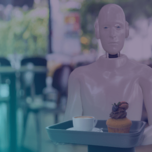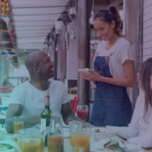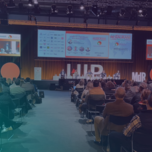The power of people in hospitality: What we took from Shine People & Culture Summit 2025

On Thursday, 22nd May, we welcomed over 200 hospitality leaders, culture champions and operators from across the UK to the 4th annual Shine People & Culture Summit 2025, in an afternoon dedicated to the people powering our industry.
Shine brought together expert voices from some of the sector’s fastest-growing and most forward-thinking brands. With five panels, 16 speakers, and a room full of curious, committed professionals, the energy was electric from the moment the doors opened.
If you were with us, thank you. If you couldn’t make it, here’s what you missed and why you’ll want to join us next year.
Setting the stage
Dan Barnes (Founder, Flourish Hospitality) kicked things off with a warm welcome and a reminder of why Shine exists: to connect the dots between people, culture and performance in hospitality.
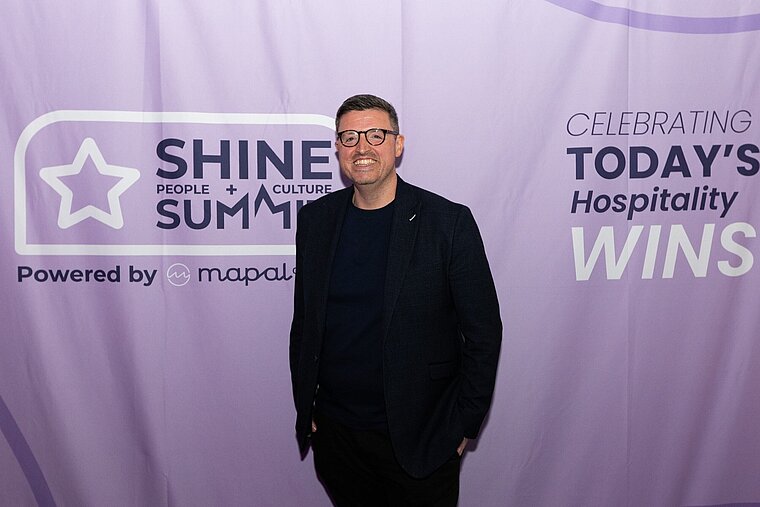
This wasn’t an afternoon of abstract ideas, it was a deep dive into what’s working right now, what’s next, and how we raise the bar together.
From concept to crowd: scaling site launches with heart
Harry Bennett (Mapal), Craig Benson (Wingstop UK) and Nicole Cockburn (Popeyes UK) shared powerful, behind-the-scenes insights into how their teams make every new opening feel like a brand-defining moment for both guests and teams.
Wingstop has grown from 0 to 57 UK sites in just a few years, and plans to open 20 more in 2025. Popeyes UK, meanwhile, has rapidly become known for creating launch-day buzz with eager customers queuing round the block, social media virality and overnight excitement.
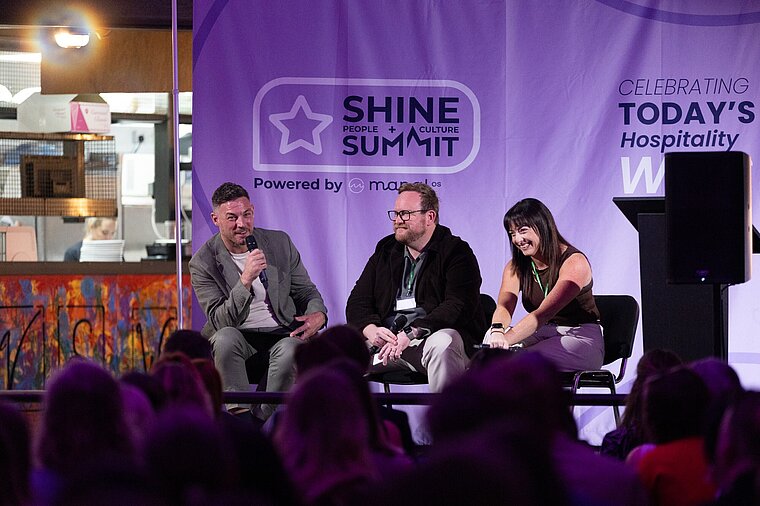
But behind the hype is a serious engine: scalable processes, culture-led training, and a focus on Gen Z talent attraction. Craig emphasised how clarity, alignment and rhythm are key for maintaining consistency across sites. Nicole highlighted how Popeyes builds launch anticipation internally too – by getting the team emotionally invested and ready to deliver the guest promise from day one.
The panellists also reflected on how local marketing, team culture and operational readiness come together and how a good launch starts well before the doors open.
“We don’t just open a store – we open a culture. That’s what people remember.” – Craig Benson
✅ Try this:
- Turn pre-opening into team-building
- Get team members involved in launch planning, playlists, or opening rituals.
- Build hype internally
- Use team comms and pre-launch sessions to help staff feel part of something bigger.
- Create a post-launch feedback loop
- After opening week, collect team reflections and guest feedback to improve the playbook.
Beyond inclusion: how neurodiverse teams drive performance
This panel reframed inclusion as a performance strategy – not a checkbox. Dorothea Jones (Inclusivation) opened the discussion by challenging the group to rethink what it means to build workplaces that support every brain.
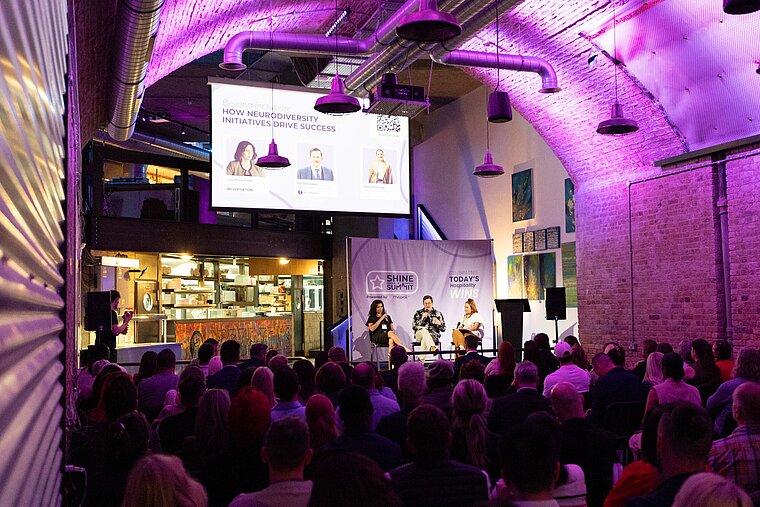
Ted Blackwell (Springboard) shared how accessibility-first digital learning is opening doors to hospitality roles for people who’ve traditionally been excluded. By prioritising clarity, visual navigation, and flexible learning paths, training becomes an opportunity instead of a barrier.
Hannah Plumb (The Alchemist) brought in the human side: how culture is shaped through day-to-day decisions. At The Alchemist, individuality isn’t just accepted, it’s celebrated. She shared how co-creating safe spaces and adjusting working styles has helped build retention, performance and guest connection.
“Inclusion is about designing differently, not doing more. It pays off in every direction – from morale to margins.” – Dorothea Jones
The panel made one thing clear: it’s not about fixing people, it’s about fixing environments so more people can thrive.
✅ Try this:
- Make training personal
- Let team members choose how and when they complete onboarding content.
- Normalise differences
- Train managers to ask “What do you need to do your best work?” as part of onboarding.
- Use peer input
- Involve neurodivergent team members in testing tools, resources or routines – they’ll know what’s working.
Looking to get deeper into the topic? Our Neurodiversity in Hospitality Guide can take you there.
Small touches, big impact: how to elevate everyday service
This lively panel, hosted by Ash Millar (Mapal), spotlighted how small, intentional tweaks in your venue or service model can lead to major commercial gains, without big budgets.
Ed Christmas (Bums on Seats) brought the numbers: with smart system changes and upsell strategies, venues saw booking increases of over 300%, SPH improvements, and over half a million in new pre-booked sales across 50 locations. Ed stressed that success doesn’t come from reinvention – it comes from refining the journey that already exists.
Filipe Borne (Lucky Voice) gave a creative perspective, sharing how Sunday-only kids parties allowed them to optimise staffing, personalise the experience and make measurement easier. He also highlighted how community-based brand partnerships (e.g. Maya Jama for Gordon’s Pink AF Gin) helped attract new demographics and create moments worth sharing.

The key message: you don’t need flashy gimmicks, just the ability to notice guest cues, tweak your model, and train teams to act in the moment.
“Guest experience starts well before the first interaction – it begins with how you design the journey.” – Filipe Borne
✅ Try this:
- Audit what already exists
- Map your customer journey from discovery to post-visit and identify where you’re leaking value.
- Test low-cost tweaks
- Use pre-booking offers, local brand collabs or in-venue micro-events to pilot new ideas.
- Upskill for personalisation
- Train your team to look for guest cues (like special occasions or returning visitors) and take action.
Talk the walk: building culture through communication
Hosted by Paddy Howley (So Let’s Talk), this session tackled a critical, yet often overlooked, area of hospitality leadership: how we communicate.
Paddy opened with a personal story about how poor communication derailed trust in one of his own past teams, setting the tone for a conversation full of honesty and practical insight.
Becky Irving (Loungers) shared how Loungers built a weekly rhythm of internal communications that’s trusted by teams across the country. From structured content planning to smart message timing, they’ve learned that consistency isn’t just nice to have – it’s foundational for trust.
Ryan Ashton (Constellation) brought in the importance of “explaining the why”, and how sharing the reasoning behind decisions, not just the outcomes, builds understanding and reduces assumptions.
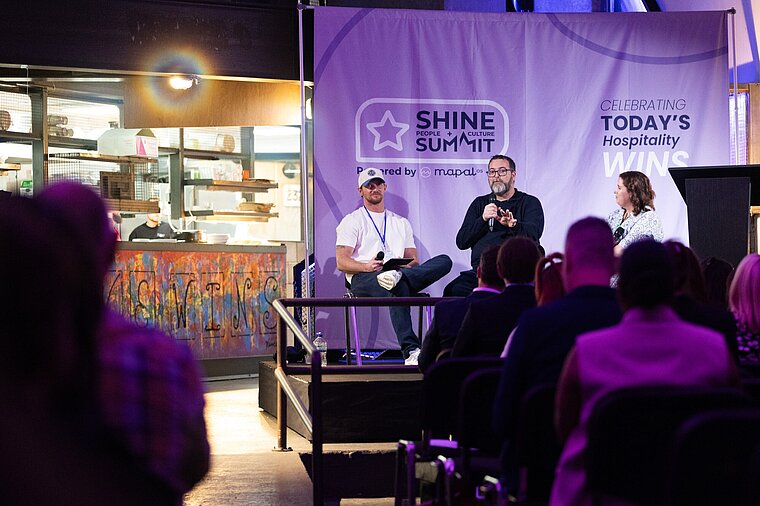
“Trust crumbles when communication is too polished or too distant. If it doesn’t feel real, people won’t buy into it – or each other.” – Paddy Howley
The panel addressed specific communication challenges unique to hospitality – including language barriers, neurodiverse learners and the front-of-house/back-of-house divide. Their advice? Make it visual, keep it short, and above all, make it two-way.
✅ Try this:
- Weekly rhythm
- Establish a consistent cadence for internal comms – even a simple Friday roundup can build trust.
- Keep it visual and human
- Use imagery, audio or short video to bring messages to life for all learners.
- Bridge the FOH/BOH divide
- Start each shift with a shared touchpoint or cross-team briefing.
- Use Engagement tools
- to invite real questions and feedback – and respond openly.
We spoke with Paddy even more in a recent video highlighting the hidden cost to mental health in hospitality.
The great debate: turning data into action
The closing keynote brought big ideas with immediate relevance. Arica Allen and Tevin Jones from Sodexo Live! took us on a journey through what it means to be an “experience engineer” – and why every operator should start treating data not as a burden, but as a tool for intentional design.
They challenged the room to rethink traditional metrics like NPS or post-service surveys, arguing that we too often measure results, not root causes. Instead, we should be focusing on the employee experience – because that’s where the guest experience starts.
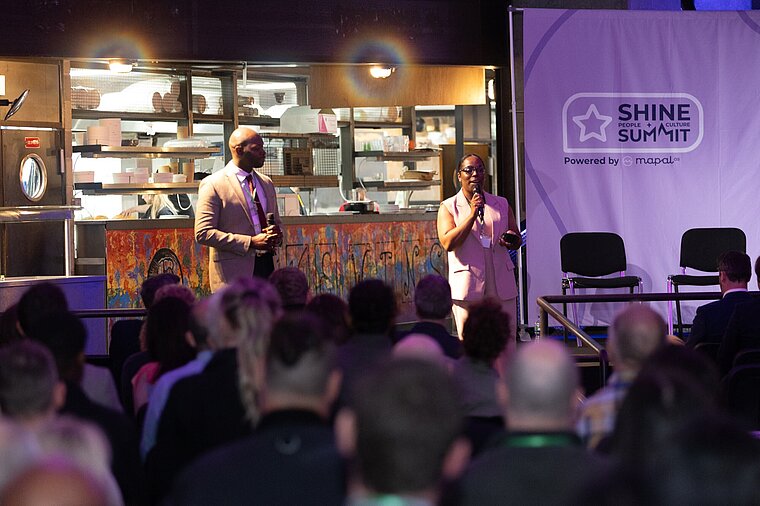
Using real case studies, Arica and Tevin showed how Sodexo Live! tracked early signs of disengagement through onboarding assessments, pulse surveys and even missed shifts – and then designed timely coaching and support to turn the trend around. The results? Reduced turnover, faster productivity and happier guests.
“If your data doesn’t lead to action, it’s just noise. Insight only matters when it changes something.” – Arica Allen
One of the most resonant ideas was the “moments that matter” framework. From onboarding and first impressions to stress points, service recovery and exits – the team highlighted how each moment in the employee journey can be measured, improved and linked directly to guest outcomes.
They also addressed a pain point many attendees could relate to: how to consolidate data from different systems. With LMS completions, engagement surveys, shift trends and operational performance often tracked separately, they argued for an integrated, behaviour-focused view.
✅ Try this:
- Map the moments that matter
- Identify key stages of the team member journey (onboarding, first shift, feedback loops, burnout triggers) and decide what to measure at each one.
- Focus on lagging and leading indicators
- Don’t just track completions – track sentiment, time-to-productivity, or correlation with guest satisfaction.
- Make data visible to the right people
- Managers can’t take action on what they don’t see – give them site-level insights and simple dashboards.
- Close the loop
- Use data to design – not just report. What systems, training or support will make those metrics move?
A final thank you
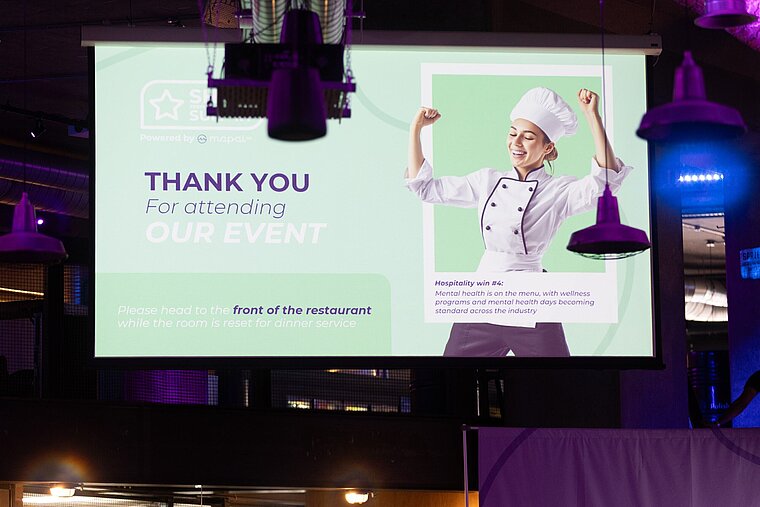
To every speaker, panellist, participant, and guest, thank you for making Shine 2025 such an energising, thoughtful and inspiring afternoon. From practical tools to bold ideas, we saw what hospitality can achieve when people are at the heart of the strategy.
We’re proud to be part of this people-first community. And we’re already planning what’s next.
Want to join us next time?
Shine is more than a summit, it’s a movement.
Sign up to stay connected and be first in line for our next event, new resources, and speaker announcements.
Need help applying these ideas?
From scalable onboarding to inclusive learning and smarter team comms, Mapal’s people-first tools are built for hospitality operators who want to do things differently – and better.
